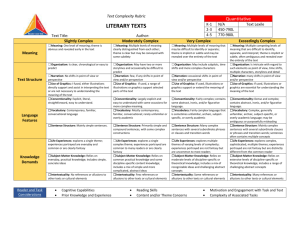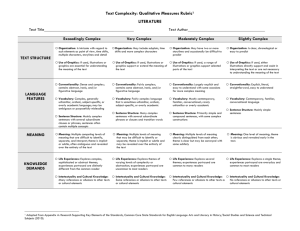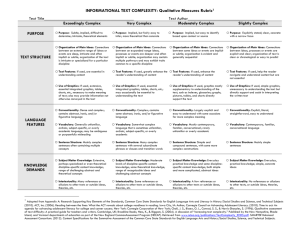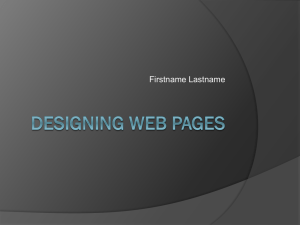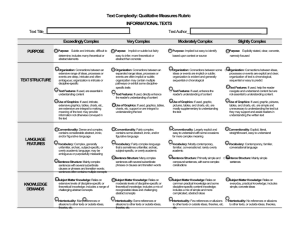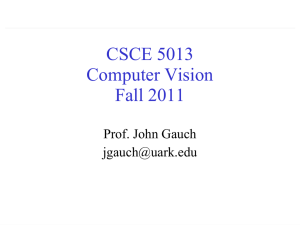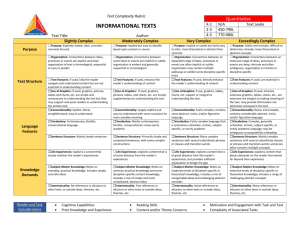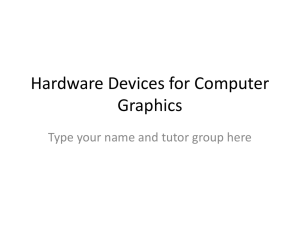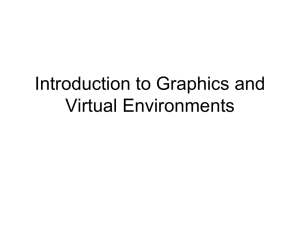Qualitative Measures Rubric--Literary Text
advertisement
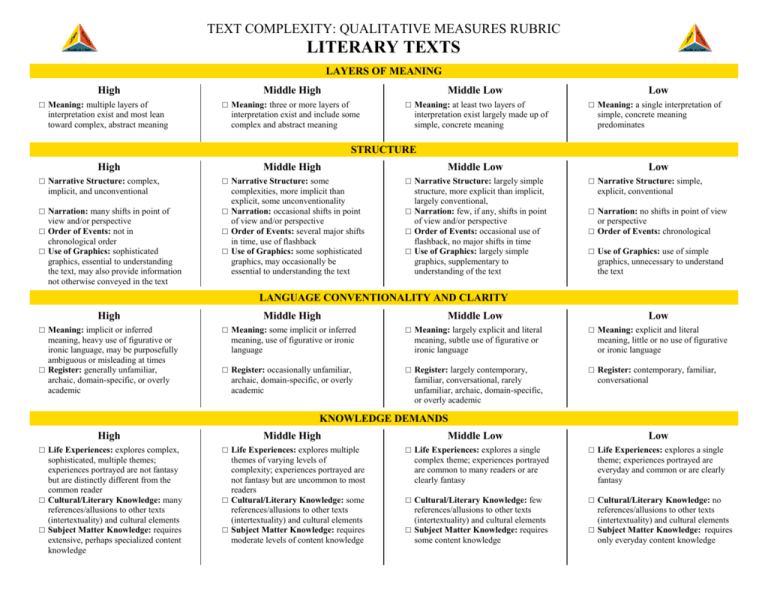
TEXT COMPLEXITY: QUALITATIVE MEASURES RUBRIC LITERARY TEXTS LAYERS OF MEANING High □ Meaning: multiple layers of interpretation exist and most lean toward complex, abstract meaning Middle High Middle Low □ Meaning: three or more layers of interpretation exist and include some complex and abstract meaning □ Meaning: at least two layers of interpretation exist largely made up of simple, concrete meaning Low □ Meaning: a single interpretation of simple, concrete meaning predominates STRUCTURE High □ Narrative Structure: complex, implicit, and unconventional □ Narration: many shifts in point of view and/or perspective □ Order of Events: not in chronological order □ Use of Graphics: sophisticated graphics, essential to understanding the text, may also provide information not otherwise conveyed in the text Middle High Middle Low □ Narrative Structure: some complexities, more implicit than explicit, some unconventionality □ Narration: occasional shifts in point of view and/or perspective □ Order of Events: several major shifts in time, use of flashback □ Use of Graphics: some sophisticated graphics, may occasionally be essential to understanding the text □ Narrative Structure: largely simple structure, more explicit than implicit, largely conventional, □ Narration: few, if any, shifts in point of view and/or perspective □ Order of Events: occasional use of flashback, no major shifts in time □ Use of Graphics: largely simple graphics, supplementary to understanding of the text Low □ Narrative Structure: simple, explicit, conventional □ Narration: no shifts in point of view or perspective □ Order of Events: chronological □ Use of Graphics: use of simple graphics, unnecessary to understand the text LANGUAGE CONVENTIONALITY AND CLARITY High □ Meaning: implicit or inferred meaning, heavy use of figurative or ironic language, may be purposefully ambiguous or misleading at times □ Register: generally unfamiliar, archaic, domain-specific, or overly academic Middle Low Low □ Meaning: some implicit or inferred meaning, use of figurative or ironic language Middle High □ Meaning: largely explicit and literal meaning, subtle use of figurative or ironic language □ Meaning: explicit and literal meaning, little or no use of figurative or ironic language □ Register: occasionally unfamiliar, archaic, domain-specific, or overly academic □ Register: largely contemporary, familiar, conversational, rarely unfamiliar, archaic, domain-specific, or overly academic □ Register: contemporary, familiar, conversational KNOWLEDGE DEMANDS High Middle High Middle Low Low □ Life Experiences: explores complex, sophisticated, multiple themes; experiences portrayed are not fantasy but are distinctly different from the common reader □ Cultural/Literary Knowledge: many references/allusions to other texts (intertextuality) and cultural elements □ Subject Matter Knowledge: requires extensive, perhaps specialized content knowledge □ Life Experiences: explores multiple themes of varying levels of complexity; experiences portrayed are not fantasy but are uncommon to most readers □ Cultural/Literary Knowledge: some references/allusions to other texts (intertextuality) and cultural elements □ Subject Matter Knowledge: requires moderate levels of content knowledge □ Life Experiences: explores a single complex theme; experiences portrayed are common to many readers or are clearly fantasy □ Life Experiences: explores a single theme; experiences portrayed are everyday and common or are clearly fantasy □ Cultural/Literary Knowledge: few references/allusions to other texts (intertextuality) and cultural elements □ Subject Matter Knowledge: requires some content knowledge □ Cultural/Literary Knowledge: no references/allusions to other texts (intertextuality) and cultural elements □ Subject Matter Knowledge: requires only everyday content knowledge
